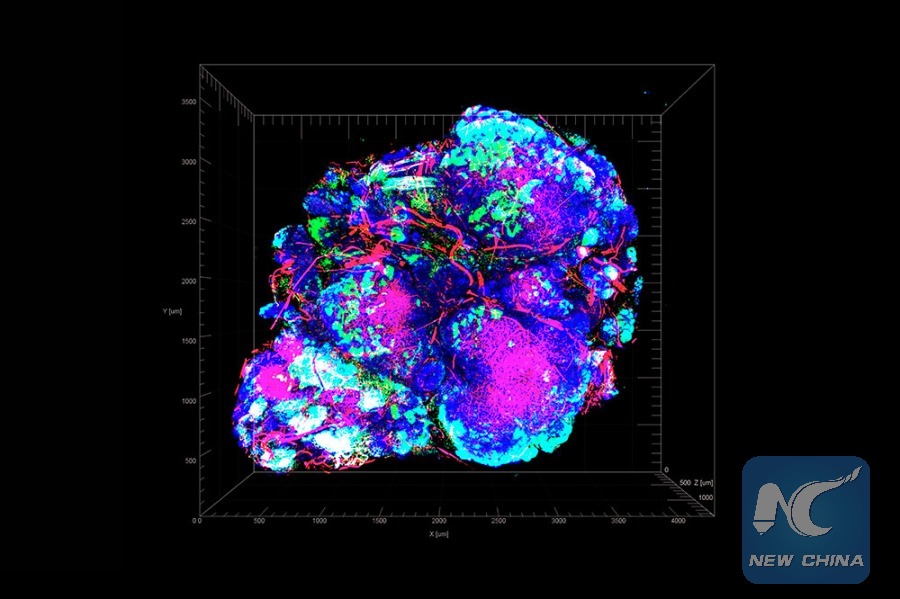
In this tumor, imaged in a mouse model of breast cancer, oxygen-low areas appear in green. These regions tend to resist standard cancer treatments. (Credit: Laboratory of Metabolic Regulation and Genetics at The Rockefeller University)
WASHINGTON, June 25 (Xinhua) -- American researchers found a potential new tactic against cancer: starving tumors by depriving them of a crucial protein they must utilize.
A study published on Monday in the journal Nature Cell Biology revealed that some ever-dividing tumor cells struggled to make enough aspartate with limited oxygen supply, possibly lending a target for cancer treatment.
Scientists from the Rockefeller University already knew that when certain tumors had outgrown their blood supply, they grew slowly under low-oxygen conditions. The oxygen molecule would participate in a vast number of a cell's chemical reactions, any of which could be limiting its growth.
They mimicked oxygen deprivation in cancer cells harvested from 28 patients, including cancers from blood, stomach, breast, colon and lung, which they cultured in the lab.
Many of these cells exhibited stunted growth under low-oxygen-like conditions. In the sensitive cells, a lack of aspartate would affect not only the production of new proteins, but also several other processes that rely on aspartate, such as the synthesis of genetic material, according to the study.
However, there's other tumors that were less sensitive, and some weren't bothered at all by the treatment.
In comparing these cells' production of chemicals, or metabolites, Javier Garcia-Bermudez, a postdoctoral associate at the university, noticed that the most sensitive ones lost the amino acid aspartate under oxygen deprivation.
Cells can't make aspartate without oxygen, but it seemed as if the resistant cells were able to obtain it from their environment, according to Garcia-Bermudez.
The researchers found there was something special about many of the cancers that resisted oxygen deprivation: they turned on a gene called SLC1A3 to suck up aspartate from their surroundings.
When Garcia-Bermudez turned on this gene in the lab-grown cancers that were normally sensitive to low oxygen, they grew faster.
The discovery might offer opportunities for creating drugs to stab cancers in this particular Achilles' heel, making them even hungrier for aspartate.
There might be several ways to prevent cancer cells from getting aspartate by blocking their methods to make the amino acid or take it up from their surroundings, according to the researchers.
If they are right, an anti-aspartate treatment might one day provide a supplement to typical chemotherapy and radiation, and it could potentially be effective for any type of tumor containing oxygen-starved areas.
Kivanc Birsoy, head of the Laboratory of Metabolic Regulation and Genetics at the university, envisioned a sort of one-two punch: One treatment for the parts of a tumor that are well-supplied with oxygen, and an aspartate blocker for the rest.
That sort of drug combination is still a long ways off, however. Birsoy now planned to investigate possible drugs that would interfere with aspartate production in the lab.

